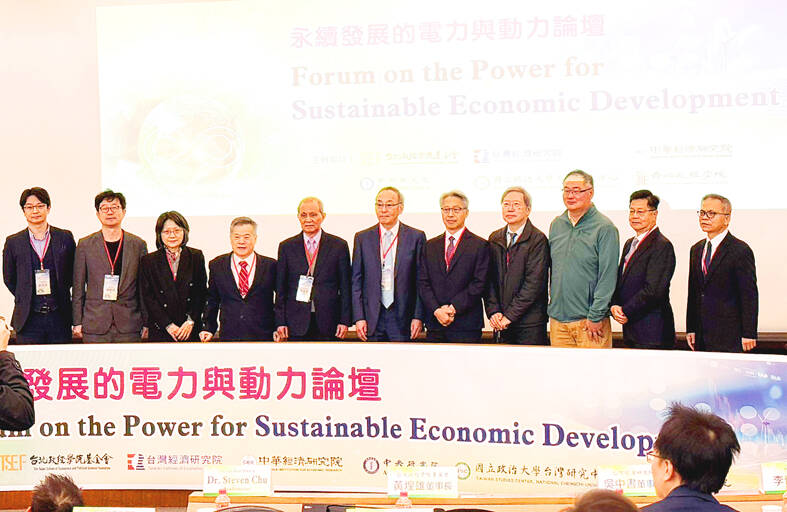The international consensus is drifting toward embracing nuclear energy, and Taiwan’s politicians, regardless of political camp, should also reconsider their stance on the controversial issue, former US secretary of energy Steven Chu (朱棣文) said yesterday at the Forum on the Power for Sustainable Economic Development in Taipei.
Nuclear power is a controversial issue in Taiwan, but other countries are again choosing it as a preferred option, Chu said.
Chu cited a shift in the US, in which the California governor had pledged to shut down two nuclear power plants, but ultimately agreed to extend the licenses for both plants for two decades.

Photo: CNA
Nuclear power provides energy security, especially when there is no wind and sunlight is weak, he said, adding that “those in the know should give voice to their opinions.”
In terms of nuclear power safety, Chu said to look at the mortality statistics for every kilowatt-hour of electricity generated, stating that the highest mortality rate was held by burning brown coal, followed, in descending order, by coal, diesel, biomass, liquefied natural gas (LNG), hydroelectricity, wind and, finally, nuclear energy.
Global tech giants such as Meta, Google, Amazon and Microsoft are also evaluating the possibility of using nuclear power, as data centers consume a lot of power, Chu said.
Commenting on net zero goals, Chu said a UN Intergovernmental Panel on Climate Change report concluded that one-quarter of greenhouse gases originated from electricity and heat generation.
The overhead required to develop renewable energy has continued to drop, Chu said, adding that photoelectric power generation overhead has decreased by 80 percent in the past decade, while land-based wind turbines have decreased by 38 percent in the same timeframe.
Forty to 60 percent of electricity would be generated by wind or solar sources by 2040, he said.
However, the power sources are intermittent and would create significant stress on the power grid, he added.
Taiwan’s power grid would need to rely on demand response measures, employ artificial intelligence and establish low-cost energy storage facilities, such as pumped-storage hydroelectricity facilities, to ease the stress on its grid, Chu said.
Taiwan must be aware of the threat of foreign powers damaging LNG pipes to destabilize its power grid, he said.
Even if renewable power comprised 50 percent of Taiwan’s power generation, the remaining half is generated by coal-fired or LNG sources, the latter of which is expensive, while Taiwan has insufficient storage facilities, he said.
At Taiwan’s current storage capacity, the nation would only have 10 days of LNG supply, making it a severe energy security issue if Taiwan was to be cut off, Chu added.

An essay competition jointly organized by a local writing society and a publisher affiliated with the Chinese Communist Party (CCP) might have contravened the Act Governing Relations Between the People of the Taiwan Area and the Mainland Area (臺灣地區與大陸地區人民關係條例), the Mainland Affairs Council (MAC) said on Thursday. “In this case, the partner organization is clearly an agency under the CCP’s Fujian Provincial Committee,” MAC Deputy Minister and spokesperson Liang Wen-chieh (梁文傑) said at a news briefing in Taipei. “It also involves bringing Taiwanese students to China with all-expenses-paid arrangements to attend award ceremonies and camps,” Liang said. Those two “characteristics” are typically sufficient

A magnitude 5.9 earthquake that struck about 33km off the coast of Hualien City was the "main shock" in a series of quakes in the area, with aftershocks expected over the next three days, the Central Weather Administration (CWA) said yesterday. Prior to the magnitude 5.9 quake shaking most of Taiwan at 6:53pm yesterday, six other earthquakes stronger than a magnitude of 4, starting with a magnitude 5.5 quake at 6:09pm, occurred in the area. CWA Seismological Center Director Wu Chien-fu (吳健富) confirmed that the quakes were all part of the same series and that the magnitude 5.5 temblor was

The brilliant blue waters, thick foliage and bucolic atmosphere on this seemingly idyllic archipelago deep in the Pacific Ocean belie the key role it now plays in a titanic geopolitical struggle. Palau is again on the front line as China, and the US and its allies prepare their forces in an intensifying contest for control over the Asia-Pacific region. The democratic nation of just 17,000 people hosts US-controlled airstrips and soon-to-be-completed radar installations that the US military describes as “critical” to monitoring vast swathes of water and airspace. It is also a key piece of the second island chain, a string of

The Central Weather Administration has issued a heat alert for southeastern Taiwan, warning of temperatures as high as 36°C today, while alerting some coastal areas of strong winds later in the day. Kaohsiung’s Neimen District (內門) and Pingtung County’s Neipu Township (內埔) are under an orange heat alert, which warns of temperatures as high as 36°C for three consecutive days, the CWA said, citing southwest winds. The heat would also extend to Tainan’s Nansi (楠西) and Yujing (玉井) districts, as well as Pingtung’s Gaoshu (高樹), Yanpu (鹽埔) and Majia (瑪家) townships, it said, forecasting highs of up to 36°C in those areas